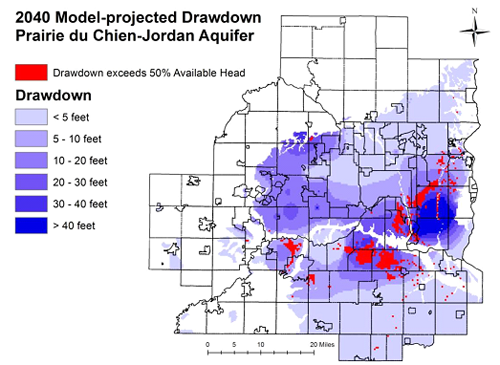White Bear Lake: A groundwater moment of truth

Aquifer levels are declining rapidly in the metro area, impacting surface waters and drinking water supplies in some communities.
Photo: Met Council
Minnesotans often think of our state as water rich. While our rivers and lakes seem abundant, groundwater levels in some portions of the state are falling rapidly. These declines can impact drinking water supplies, as well as the health of our lakes and rivers.
The poster child for aquifer impacts on surface waters is White Bear Lake. Water levels in the lake have fallen dramatically in recent years - leaving lakeshore owners, businesses and lake lovers high and dry. Similar concerns are surfacing in other portions of the state.
White Bear Lakes high profile water level decline is driven by the unsustainable pumping of groundwater for municipal water supplies in fast-growing northeast suburban communities. This excessive groundwater pumping has depleted water levels in the Prairie du Chien-Jordan aquifer that feeds White Bear Lake. While some have pushed for an expensive plan to augment lake levels by pumping Mississippi River water into White Bear, others, including FMR are advocating for more sustainable solutions.
A moment of truth
Recently, FMR Executive Director Whitney Clark teamed up with Steve Woods at the Freshwater Society and Scott Strand at Minnesota Center for Environmental Advocacy to author this commentary in the Pioneer Press on the importance of a sustainable solution to White Bear Lake area groundwater management.
The Star Tribune offered their own similar commentary, also calling into question the wisdom of spending taxpayer dollars on lake management without first addressing the overuse of groundwater.
The Metropolitan Councils water supply manager, Ali Elhassan, is leading efforts to develop sustainable water supply management strategies in the northeast metro. His efforts, highlighted in the Met Councils recent groundwater article, offer insights into the future of sustainable groundwater management.
These articles have helped highlight the vital importance of managing our surface waters and groundwater supplies in a sustainable manner.
As Whitney and his co-authors wrote in the Pioneer Press:
Any decisions about the future of our groundwater, lakes and rivers must look toward meeting the needs of the present without compromising the ability of future generations to meet their own needs. The high-profile decline of White Bear Lake provides policy makers with an opportunity to change groundwater management in the state to reflect that sustainable principle. Will enlightened thinking prevail or will the shortsighted, unsustainable old ways continue to hold sway? We're about to find out.